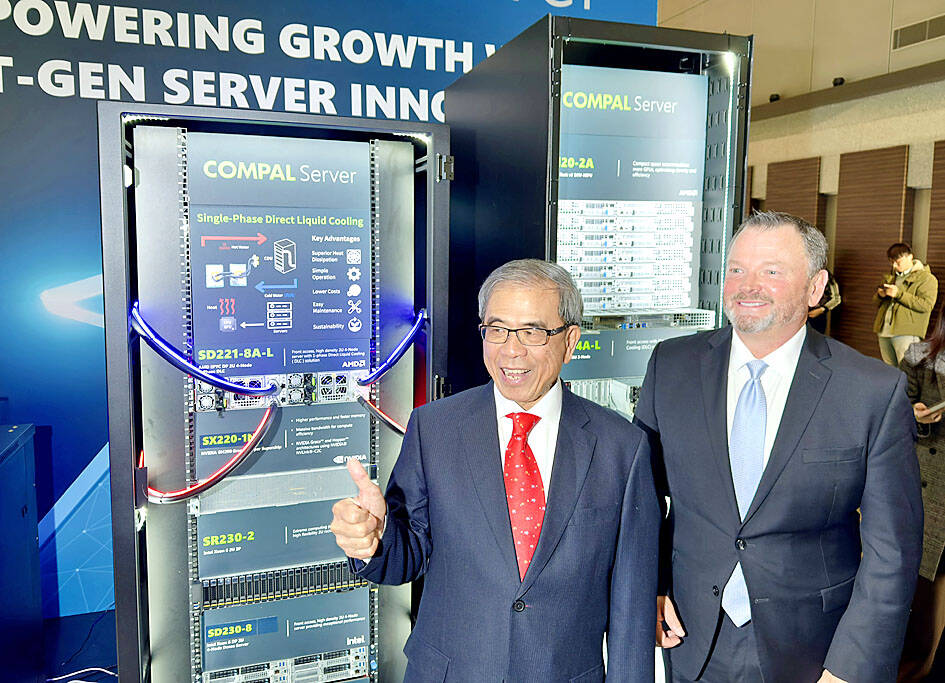Compal Electronics Inc (仁寶), one of the largest contract notebook computer makers in Taiwan, yesterday said that Texas is one of its top options as it considers investing in the US.
Speaking with reporters on the sidelines of the company’s weiya (尾牙), or year-end dinner, Compal president Anthony Peter Bonadero said that in response to the return to the White House of US president-elect Donald Trump, who vowed to raise tariffs during his campaign trail, the company is considering investments in the US.
Compal is looking at several options in particular states in the southern US, and Texas is one of the leading options, as it is the only state in the US with an independent electricity grid network, Bonadero said.

Photo: Fang Wei-chieh, Taipei Times
Compal, which also makes artificial intelligence (AI) servers, is one of several Taiwanese tech firms to list Texas as their top investment venue option.
Over the weekend, Inventec Corp (英業達) president Jack Tsai (蔡枝安), another AI server maker in Taiwan, also said that Texas is a likely choice for its US investments, citing the state’s adequate power supply, as well as its proximity to Mexico.
As global demand for AI servers largely comes from four mega data centers in the US, it is no surprise that Compal is thinking about investments in manufacturing in North America over the longer term, Bonadero said.
The company is expanding its talent pool for the fast-growing server business, while assessing a production expansion plan, he said.
Compal has joined US-based AI chip designer Nvidia Corp’s MGX server platform — a modular reference design supporting diverse applications, from remote visualization to edge supercomputing, he said.
The company aims to strengthen its ties with the US AI giant, he added.
AI servers would account for 15 percent to 20 percent of the company’s sales generated by servers this year, up from last year’s low single digits, as the company aggressively searches for business opportunities created by the Nvidia MGX ecosystem, he said.
While the large language model — which refers to a type of machine learning model designed for natural language processing tasks such as language generation — is a very important field for AI server development, Compal would also explore other areas for growth, he said.
In addition, demand for AI PCs is expected to grow this year due to the end of support from Windows 10 in the fourth quarter of the year with replacements of Chromebook computers, he said.
Demand for AI PCs would account for more than 40 percent of total PC sales next year, he said.
The company has laid a solid foundation in PC and smart device production and is looking for a new growth driver, Compal chairman Ray Chen (陳瑞聰) said.
It expects AI servers, automotive electronics and 5G products to become major sources of sales, he said.

UNCERTAINTY: Innolux activated a stringent supply chain management mechanism, as it did during the COVID-19 pandemic, to ensure optimal inventory levels for customers Flat-panel display makers AUO Corp (友達) and Innolux Corp (群創) yesterday said that about 12 to 20 percent of their display business is at risk of potential US tariffs and that they would relocate production or shipment destinations to mitigate the levies’ effects. US tariffs would have a direct impact of US$200 million on AUO’s revenue, company chairman Paul Peng (彭雙浪) told reporters on the sidelines of the Touch Taiwan trade show in Taipei yesterday. That would make up about 12 percent of the company’s overall revenue. To cope with the tariff uncertainty, AUO plans to allocate its production to manufacturing facilities in

TAKING STOCK: A Taiwanese cookware firm in Vietnam urged customers to assess inventory or place orders early so shipments can reach the US while tariffs are paused Taiwanese businesses in Vietnam are exploring alternatives after the White House imposed a 46 percent import duty on Vietnamese goods, following US President Donald Trump’s announcement of “reciprocal” tariffs on the US’ trading partners. Lo Shih-liang (羅世良), chairman of Brico Industry Co (裕茂工業), a Taiwanese company that manufactures cast iron cookware and stove components in Vietnam, said that more than 40 percent of his business was tied to the US market, describing the constant US policy shifts as an emotional roller coaster. “I work during the day and stay up all night watching the news. I’ve been following US news until 3am

COLLABORATION: Given Taiwan’s key position in global supply chains, the US firm is discussing strategies with local partners and clients to deal with global uncertainties Advanced Micro Devices Inc (AMD) yesterday said it is meeting with local ecosystem partners, including Taiwan Semiconductor Manufacturing Co (TSMC, 台積電), to discuss strategies, including long-term manufacturing, to navigate uncertainties such as US tariffs, as Taiwan occupies an important position in global supply chains. AMD chief executive officer Lisa Su (蘇姿丰) told reporters that Taiwan is an important part of the chip designer’s ecosystem and she is discussing with partners and customers in Taiwan to forge strong collaborations on different areas during this critical period. AMD has just become the first artificial-intelligence (AI) server chip customer of TSMC to utilize its advanced

Six years ago, LVMH’s billionaire CEO Bernard Arnault and US President Donald Trump cut the blue ribbon on a factory in rural Texas that would make designer handbags for Louis Vuitton, one of the world’s best-known luxury brands. However, since the high-profile opening, the factory has faced a host of problems limiting production, 11 former Louis Vuitton employees said. The site has consistently ranked among the worst-performing for Louis Vuitton globally, “significantly” underperforming other facilities, said three former Louis Vuitton workers and a senior industry source, who cited internal rankings shared with staff. The plant’s problems — which have not